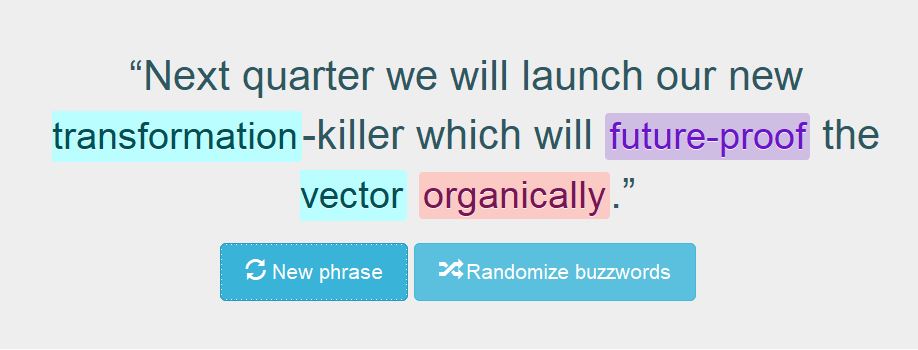While America leads the world in adult science literacy, that is still with under 30 percent of the population. To really reach the public, we need to use language that won't be a turn-off. Jargon may make us feel smarter, but it makes people who lack the vocabulary feel dumber, and that is a violation of smart journalism.
A new study found that people exposed to jargon when reading about subjects like self-driving cars and surgical robots later said they were less interested in science than others who read about the same topics, but without the use of specialized terms. They also felt less likely to think they were good at science, felt less informed about science, and felt less qualified to discuss science topics.

If this statement makes you feel like you are being let in on one of nature's secrets, you probably shouldn't talk to the public. Credit: WSJ Buzzword Generator.
The method
In the study, 650 adults participated online. They read a paragraph about each of three science and technology topics: self-driving cars, surgical robots and 3D bio-printing. About half of them read versions of the paragraphs with no jargon and half read versions with jargon.
For example, one of the sentences in the high-jargon version of the surgical robots paragraph read: "This system works because of AI integration through motion scaling and tremor reduction."
The no-jargon version of that same sentence read: "This system works because of programming that makes the robot's movements more precise and less shaky."
Half of the people who read the high-jargon versions were also offered the opportunity to see the jargon terms defined. When they held their computer mouse over an underlined jargon term, a text box appeared with the definition - the exact language used in the no-jargon version.
After reading each paragraph, participants rated how easy it was to read. After they read all three paragraphs, participants completed a variety of measures examining issues like their interest in science and how much they thought they knew about science.
Participants who read the high-jargon paragraphs thought they were more difficult to read than did those who read the no-jargon descriptions - even if they had the definitions available to them. People who read no-jargon versions felt more empowered.
Jargon tells the public, the taxpayers who fund academic science, they are not part of the tribe - that's bad for funding
Some will argue that if jargon terms like "vigilance decrement" and "laparoscopy" are defined, that makes it okay. But it isn't; readers felt just as disengaged as readers who read jargon that wasn't explained.
Jargon is a signal that tells people that they don't belong. Since government, and that means taxes, fund nearly 40 percent of science in America, and America leads the world in science output and Nobel prizes, it's bad to treat the people writing checks like they don't belong. They may believe that is true. As NASA reminded employees in the 1960s, "No bucks, No Buck Rogers."
Politicians certainly know this. We have all seen candidates who change their style and language based on the audience.
Worse, it leads to distrust in science
In an earlier paper (same participants), the researchers found that reading jargon led people to not believe the science.
In science audiences, the opposite will be true. Experts want details, not breezy consumer narratives. And then Science 2.0 will have a cross-section. While most won't be experts in a narrow field, scientific literacy, and patience for jargon will be much higher.
The overall lesson is that 65 million people in America want to read about science, and care about the issues. Let's not do anything to turn them off.




Comments